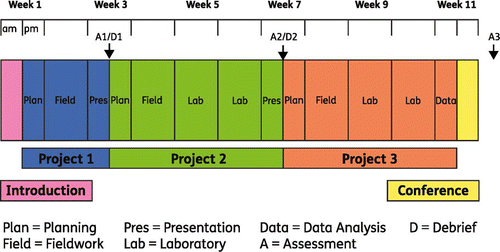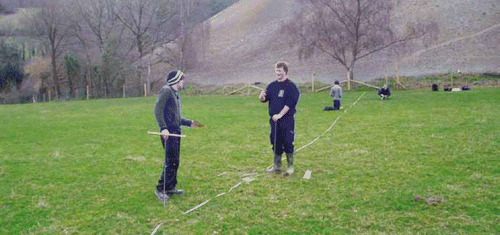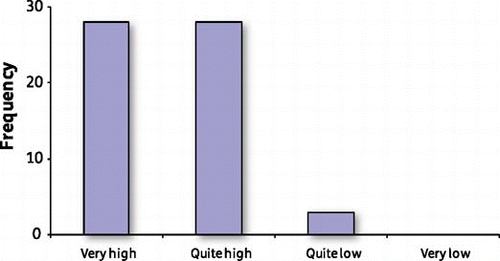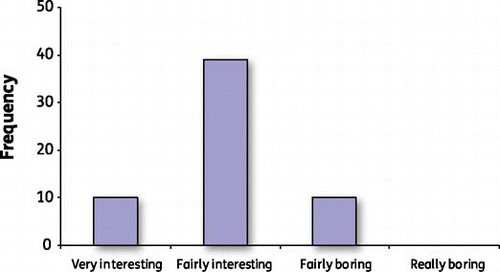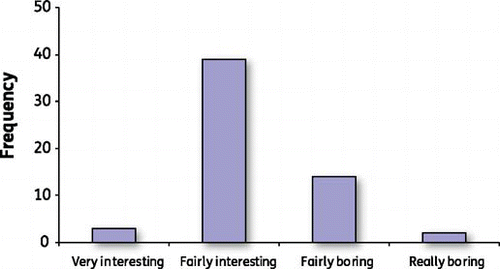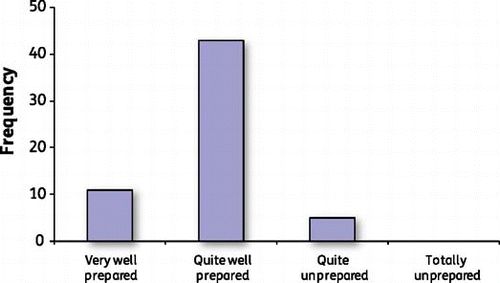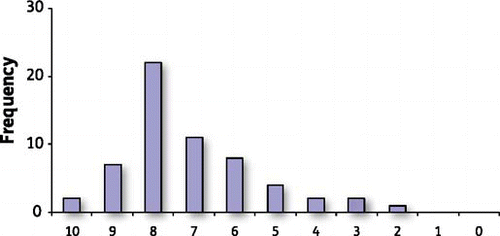Abstract
This paper discusses the design, implementation and benefits of a project-based, problem-driven approach to a stage one research skills module. Participating students on the BSc Environmental Science programme at the University of Plymouth responded positively to the experience of undertaking applied field- and laboratory-based projects designed to address ‘real-world’ problems. Students reported significant gains in their understanding of the research process, confidence to undertake research, the ability to work in groups and the ability to reflect on their projects. Potential pitfalls of the approach are identified and actions taken to address these are outlined.
Introduction
The development of research skills is critical to the education of environmental science students. Many of the key graduate skills identified in the subject benchmark statement (CitationQAA, 2007) are fundamental to the process of undertaking research. One of the most effective ways that students can learn practical field and laboratory skills is through ‘hands-on’ practice. Adopting a project-based approach ensures that practical techniques become part of the means for hypothesis testing or problem solving and this aligns with the model of experiential learning developed by Kolb (CitationHealey and Jenkins, 2000). Moreover, placing project work in a field context can provide a taste of ‘real research’ (CitationGold et al., 1991).
CitationSpronken-Smith (2005) used a problem-based learning (PBL) approach to teach research methods and found that students benefitted through group work on authentic problems and being able to develop transferable skills. Other practitioners report that the use of PBL in field-based learning led to perceived enhancements in student ‘ownership’ of projects, better pre-field preparation, and improved attendance, participation and enjoyment (CitationBradbeer 1996; CitationPerkins et al., 2001; CitationChappell, 2001). However, CitationPawson et al., (2006) identify risks associated with PBL including resource implications and loss of emphasis on content.
Rationale for change
The predominant role of the Environmental Techniques modules is to deliver training in field and laboratory skills at stage one of the BSc Environmental Science. In 2005, both modules were overhauled due to a staff perception that the term two module had flaws in its design. Up to that time, the module comprised a non-residential, week-long field course and a series of ‘stand-alone’ field and laboratory days. Time compression of field activities led to restricted opportunities for pre-field preparation and post-field data interpretation and ensured exclusive reliance on portable instrumentation. Student attendance at day sessions was patchy and strongly related to assessment.
The modified approach adopted was intended to promote student responsibility for project management, to create a stronger sense of project ‘ownership’ and to enhance motivation and participation. The module was structured to give staff the opportunity to support groups which were struggling, and the term one Environmental Techniques module was modified to include training in key laboratory techniques.
Module and project design
The redesigned module required students to complete three research projects each characterised by a ‘real world’ problem. All projects featured a fieldwork component and two required laboratory work to generate original data (). A highly structured approach was adopted with timetabled sessions running over eleven consecutive Mondays.
Projects began with a planning session where each group (~4 students) was given a problem statement, relevant site information and research literature (). Groups were required to complete a ‘Project Template’; a written description of the project objectives, the proposed strategies for sampling and analysis, the anticipated dataset and an execution plan. Students were also required to predict their needs for field equipment and laboratory services.
Assessment differed for the three projects and comprised an oral presentation, poster presentation and a written report. Groups also underwent two assessed debriefing discussions to promote reflection and to identify areas for improvement. The module ended with a mini-conference of presentations from outside speakers to place the student experience in an external context (See CitationWorsley, 2001). Speakers were engaged in environmental management activities related to the research undertaken by students. Many speakers were former students from the environmental science programme.
Research projects focused on the environmental impacts of human activities in a river catchment. Nine projects were devised meeting specific criteria (). One set of projects addressed the current issues of land contamination associated with historical lead mining. The problem statements illustrate the biogeochemical processes which influence the environmental impacts of heavy metal contamination, an example of which is given below:
“The local farmer is concerned about the agricultural field located to the east of the spoil heap, particularly in the area next to the unvegetated waste. He wants to know if the soils and grass in this area contain metal levels above those expected in uncontaminated areas. He also wants to know if there could be risks to the health of his livestock which are grazing in the agricultural field.”
Table 1 Requirements for a viable project.
Student groups have responded to this brief with a variety of sampling strategies including transect- or grid-based patterns (), collection of surface soils and grass and analysis for lead and zinc.
Evaluation strategy
Evaluation was undertaken using questionnaires and focus groups at the end of the module in March 2007. Fifty-nine completed questionnaires were received from a total of 84 students giving a response rate of 70%. Two focus groups were run to identify the positive and negative perceptions of students and staff respectively. The Nominal Group Technique (NGT) was used to encourage participation of all members and to generate a set of positive and negative perceptions (CitationO'Neill & Jackson, 1983).One limitation of this technique is that it did not reveal the balance between positive and negative perceptions. Focus group results are interpreted therefore in the overall context of the questionnaire responses.
Student response
The level of involvement in the projects was reported as high () which students related to the projects' experiential nature and a sense of group ownership. Students' levels of interest in their own and others' projects were quite high ( and ) and were attributed to their problem-based, ‘real world’ nature and group ownership. However, some students reported a lack of variety of projects and inconclusive results. Modifications were made to projects in the subsequent year to address these issues. Students felt well prepared for fieldwork () which was mainly attributed to the planning sessions. When asked if they had enjoyed the module, student response was predominantly positive ().
Students were asked how particular skills and feelings had changed as a result of taking the module: this involved them making a retrospective assessment of their abilities of three months beforehand. Students perceived significant increases (p<0.001) in their understanding of the research process () and levels of confidence in taking on an individual project (). These improvements were predominantly attributed to the opportunity for hands-on practice. Students also valued undertaking several projects in sequence based on applied, problem-based scenarios. Significant increases (p<0.05) were also recorded for students' perceptions of their ability to work in a group () and their ability to reflect on their project work ().
Figure 10 “If you were asked to undertake a research project on your own, how confident would you feel?”

The focus group confirmed the perceived value to students of the ‘real-world’, project-based approach and the variety of both field locations and assessment methods (). It also brought up positive and negative aspects of group working i.e. social interaction and group conflicts respectively. Planning sessions attracted some negative comments although this is not supported by the high degree of preparedness for fieldwork. In any case, this may have reflected the unfamiliarity of some staff with the content of some projects, an issue that was resolved in subsequent years through experience. Inequality of assessment deadlines was a misconception based on the need to set deadlines for some groups after the Easter vacation.
Table 2 Outcomes of student focus group (n=9).
Staff response
Staff felt that the module was ambitious in its aims but that on the whole students were meeting the challenge. Several respondents admitted that they had not expected the students to perform as well as they did but acknowledged that the highly structured approach contributed to this. Staff perceived student participation as high. Those staff (n=4) who had taught both on the modified module and its predecessor reported enhanced quality of oral presentations on the new version. Staff particularly valued the project-based approach to skills development (). Negative aspects include the loss of ‘immersion’ in the field environment despite the fact that this change allowed more meaningful projects to be undertaken. Some of the other negative aspects reflect the intensive nature of the module, both for staff and students.
Table 3 Outcomes of staff focus group (n=7).
Discussion
Overall, students responded well to the module and their perceptions of high levels of participation, enjoyment and project ‘ownership’ concur with the outcomes of related innovations (CitationBradbeer 1996; CitationPerkins et al., 2001; CitationChappell, 2001). A strong theme within student feedback was the value of directly experiencing practical research projects. Enhanced confidence in research was attributed to repeatedly undertaking short-term projects, being assessed (in differing formats) and reflecting on the experience after each one. The ‘real world’ context provided by the problem-orientated approach was also valued by students who felt that it made the research more interesting and relevant. Many students saw preparedness for fieldwork was associated with the planning sessions which confirms previous research in this area (CitationOrion & Hofstein, 1994).
The project-based approach was welcomed by staff who ranked it as the most important positive attribute of the modified module design. The focus on biogeochemistry requires chemical analysis of field samples to reveal the invisible processes operating in the environment. Thus the “decompression” of fieldwork from the intensive week-long format and inclusion of laboratory sessions allowed student project work to become more sophisticated. Problem statements needed to be framed so that they could be addressed predominantly, but not exclusively, through data generation. Development of appropriate projects required considerable effort which is a characteristic of problem-led approaches (CitationPawson et al., 2006). This issue was addressed by locating projects at field sites which had been the subject of prior research by final year project students. Also, funding was obtained from the Experiential Learning CETL to acquire additional data to underpin project development.
This teaching approach does not fall neatly into the definitions of either ‘project-based’ or ‘problem-based’ learning given by CitationSavin-Baden & Howell Major (2004) but features characteristics of both. In common with PBL, it is the problem statement that defines what is to be learnt, and student groups should decide what knowledge and data they need to address it. However in this module, it is arguable as to whether the problems are ‘open-ended’. In the mind of the tutor there is likely to be a ‘pre-set’ sampling and analytical strategy that will generate the optimum dataset over the available timescale. This aligns more with project-based learning where the task is highly structured and the student group is developing a solution or strategy. The module design described here allows a tutor to vary their teaching style in response to each group's ability. A hands-off, facilitating approach used for more capable groups is problem-based and encourages student initiatives. A more interventionist style, used for less capable groups, could be more prescriptive, increasing the project-based character. This flexibility is important in a stage 1 module where students are being introduced to the research process and are experiencing for the first time the responsibility of undertaking a research project from ‘cradle to grave’.
Students often referred to the benefits of collaborative learning, particularly its affect on participation and the support gained through shared responsibility. On the other hand, failures in group dynamics were ranked as the most common negative feature of the module, which is a potential problem of group work (CitationPawson et al., 2006). Subsequent developments have addressed this issue by expanding the group work skills session in the module introduction to require student groups to complete a “Ground Rules Contract” (CitationDouglas, 2000). Students also have the option to use a peer assessment mechanism to penalise group members who are felt not to have contributed sufficiently to the project. In practice, this has been rarely employed.
Conclusions
A project-based, problem-driven approach was introduced to a stage 1 practical skills module. Key design elements are the use of hands-on projects linked to ‘real world’ problem scenarios, the module's highly structured nature, the flexibility of approach allowed to tutors and the use of a mixture of assessment formats. Perceived benefits are high levels of student participation, interest, enjoyment and sense of project ‘ownership’ by student groups. As a result of taking the module, students reported significant gains in their understanding of, and their confidence to undertake research, their ability to work in groups and their ability to reflect on project work. Subsequent developments have seen a project-based approach introduced into stage 2 field courses in order to adjust to the extra experience carried by students progressing from Stage 1.
References
- BradbeerJ. 1996 Problem-based learning and fieldwork: a better method of preparation? Journal of Geography in Higher Education, 20, 11–18
- ChappellA. 2001 Challenging the teaching convention in geography using problem-based leaning: the role of reflective practice in supporting change, Planet, Special Edition 2, 18–21
- DouglasT., 2000 Basic Groupwork (2nd Edition), Routledge
- GoldJ.R.et al 1991 Fieldwork. In Teaching Geography in Higher Education — a manual of good practice, Blackwell, Oxford, 21–35
- HealeyM. and JenkinsA. 2000 Kolb's experiential learning theory and its application in geography in higher education, Journal of Geography, 99, 185–195
- O'NeillM.J., and JacksonL. 1983 Nominal group technique: a process for initiating curriculum development in higher education, Studies in Higher Education 8, 2, 129–138
- OrionN. and HofsteinA. 1994 Factors that influence learning during a scientific field trip in a natural environment, Journal of Research in Science Teaching, 31, 1097–1119
- PawsonE., FournierE., HaighM., MunizO., TraffordJ. and VajoczkiS. 2006 Problem-based learning in geography: towards a critical assessment of its purposes, benefits and risks, Journal of Geography in Higher Education, 30, 103–116
- PerkinsC., EvansM., GavinH., JohnsJ., and MooreJ., 2001 Fieldwork and problem-based learning. Planet, Special Edition 2, 27–28.
- QAA 2007 Benchmark statement for earth sciences, environmental sciences and environmental studies, Quality Assurance Agency for Higher Education, Gloucester
- Savin-BadenM. and HowellMajor C. 2004 Foundations of Problem-based Learning, Open University Press.
- Spronken-SmithR. 2005 Implementing a problem-based learning approach for teaching research methods in geography, Journal of Geography in Higher Education, 29, 203–221
- WorsleyA., 2001 A pilot study using the mini-conference to externalise geo-assessment, Planet, Special Edition 1, 25–26
